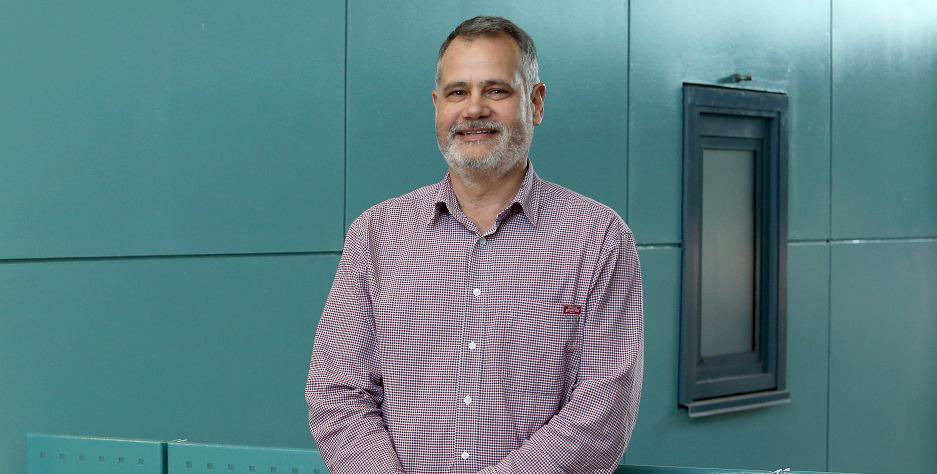The man tasked with setting Ipswich City Council on the straight and narrow as interim administrator has had some tough challenges throughout his career. The first was as a teenager – painting white picket fences in the Far North Queensland heat with his father.
Greg Chemello sits back. He’s not slouching, but he’s relaxed. Occasionally, his hands reach behind his head and clasp, but more often they’re in front of him helping tell the story. He is, after all, the son of an Italian house painter.
He’s Ipswich’s new interim administrator. His voice harbours poise. Not a graceful, elegant type of poise. Rather, a balanced equilibrium which comes with experience.
Writing a new planning act
It’s the calm approach he used to steer his team through 18 months to write a new Planning Act for Queensland in 2013-14.
The average time for preparing new planning legislation across Australia is five years.
How did the Queensland team do it so fast? There were a number of factors, but the key – according to Greg at least – was that he kept the team focused on the task at hand, not allowing them to be distracted by the many issues, constraints and roadblocks they encountered along the way.
When he started that role in February 2013, legislation had already been changed. The State Assessment and Referral Authority (SARA) was to start on July 1 – just five months away. And nobody seemed to be leading that work.
Sure, people were doing stuff – writing stuff, asking questions, taking notes, making progress. “But I needed one person living and breathing this one single project,” Greg says.
“I had an extremely talented team, but I needed to recruit the key leadership roles to drive this project, which I did.
“As much as I then walked around at work saying that everything was okay and we would easily get there, I lay awake at night for much of that five months worrying it probably wouldn’t happen.”
Greg tells that story for a reason.
The latest challenge
Despite the pain and suffering which Ipswich City Council has been through, the police investigations, the arrests, the upheaval which comes with new people in old positions, the confusion and endemic cultural issues – despite all that – he doesn’t feel that way now.
He doesn’t lie awake at night worrying that things might not happen.
“I volunteered to be one of the five people on the interim management committee because I was personally offended by what some in the council’s leadership team had done, and had been alleged to have done,” he says.
“And when offered this main role I knew it was the only chance I would get to help make a fundamental difference. It’s not every day that councils go into administration – the last one was 10 years ago – and I wanted to make a difference.”
He’s not one to die wondering. As he puts it, he won’t be sitting in his rocking chair thinking about the opportunities he let slip by.
Braced for the challenge, he assessed the talent of the organisation and quickly realised Ipswich was in fact in pretty good shape.
Recent history had been unquestionably unkind. But there were positive signs.
There were early hurdles: Face up to and address any outstanding issues of management and staff behaviours. Fix the stalled CBD redevelopment. Fix some untidy governance practices. And fix any remaining confusion about how waste should be managed.
Family life
Greg has two children, aged 21 and 20. “I’ve been told that I have to call them young adults now,” he says. Only four months ago, he married Dianna.
At home, it’s a hoot. With somewhat rusty piano skills, he draws from a childhood of eisteddfod piano and singing trophies to entertain those who’ll listen, including the cat – there are no dogs, just the cat.
It was a long time ago his voice broke, at 14, when he decided an entertainment career was probably off the table.
The second of three boys and raised in Atherton, Far North Queensland, he played rugby league and soccer before having a crack at basketball. He says his sporting pinnacle was the 14 and under National Basketball Championship in Devonport Tasmania, where apparently it was “bloody cold!” His FNQ team came fourth.
Yet, like singing, basketball wasn’t going to pay the bills. His career in his mind, was a given, mapped out more by fate than design.
Dad’s influence
“Dad was a house painter, I grew up seeing and analysing different houses with him. So I wanted to be an architect. If dad had been born later or into a wealthier family, he would be been a great architect I reckon,” he says.
But his dreams grew, and so did his ambition. He studied town planning at UQ. “Why design a house when you can design a city?” he thought.
Among Greg’s first jobs was painting white picket fences for his father in Far North Queensland. “Dad wanted to show me the alternative to university.”
The ambition begins
He was a kitchen hand at Big Rooster during school, then during uni a DJ at the Inala roller skating rink.
His first “real” job was within the Coordinator General’s office under the direction of Sir Joh Bjelke-Petersen, and later Mike Ahern. However, six years in government is a long time for a motivated man, by his own admission still learning the ropes.
“I’d followed up on my planning degree with masters degrees in environmental science and business. Half way through my MBA, I knew I had to leave government,” he recalls.
“I approached a development company and suggested they create a job for me to help deliver their World Trade Centre ambitions. I worked with two developers – the first one going broke in ‘the recession we had to have’ – for six years on World Trade Centre projects in Brisbane, Adelaide and Auckland. I was a pretty driven young bloke.”
Mr Fixit
He’s been made redundant twice, took on the challenge of managing the Queensland Dairy Authority out of existence in the mid 1990s, and led the creation of the Major Sports Facilities Authority (MSFA) that manages the state’s biggest stadiums – the Gabba, Suncorp Stadium, QEII and the Sleeman Centre – towards a super trust fund that would later become Stadiums Queensland.
“It took 18 months, but that was one time when a plan really worked,” he says.
There have been other property roles and his latest as general manager of Economic Development Queensland, from where he was seconded to straighten the course of the Ipswich City Council ship.
A squishy reminder
On his desk, there’s an ageing Telstra-branded squishy. It’s an old school stress-type version, not the trendy type causing ill-health to the latest generation.
It’s there as a reminder of when somebody came to his rescue.
When Brisbane City Council agreed to transfer its venues to the state for $1 – “there’s a long story behind that negotiation” – Greg moved from the council to establish the MSFA.
He knew then-Brisbane mayor Jim Soorley was going to switch off council’s links to the Sleeman Centre, QE11 and the Brisbane Entertainment Centre on the agreed date of June 30, 2002. But the state didn’t share his angst.
“I struggled to get them focused on the need set up the basics of power, phones, IT systems, the lot,” he recalls.
A team from the phone company performed miracles, delivering a raft of services way beyond their traditional role.
“They saved the state, council and me,” he says. And he has kept their squishy gift on his desk at every job ever since as a reminder of the powerful capability of a motivated team.
It’s that reminder of the greater good, the way teams can achieve great things, that Greg hopes to carry into every project he leads in Ipswich, a city crying out for leadership, good governance, stability, and a very exciting future.



0.5
5